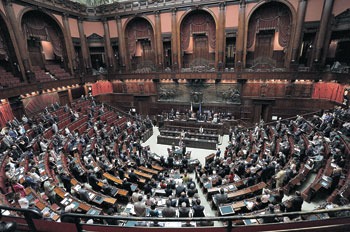from Stefano De Martis
In Denmark, a collective of artists has publicly announced that it wants to participate in the elections – which will be held in that country in 2023 – with a “synthetic party” whose program has been written through an artificial intelligence system, drawing on all the proposals presented by the others left from 1970 onwards. It is not known whether the group will be able to collect the necessary signatures to compete for a seat in the Folketinget.
The fact remains of a political and cultural provocation that touches an extremely sensitive nerve in almost all Western democracies, including ours, as the electoral campaign nearing its conclusion also demonstrates. What about the parties outlined by the Constitution? Article 49 states that “all citizens have the right to freely associate in parties to compete with a democratic method to determine national policy”. But today on the scene we only see leaders engaged in single combat against other leaders, and many voters – it must be admitted – have now deeply introjected this scheme.
The customization of political competition is certainly not a new phenomenon, if it is true that the crisis of mass parties is usually dated to the eighties of the last century (“Tangentopoli” explodes immediately at the beginning of the following decade, the nineties). However, the phenomenon has become extreme in more recent times, in the wake of that epochal dynamic that goes by the name of “disintermediation”.
Largely attributable to the digital revolution, this dynamic has strongly questioned all the social bodies that define themselves as “intermediate”. If some areas have been able to express a remarkable resilience and capacity for regeneration, just think of the realities of the third sector, in the specifically political field the process has had destabilizing results, as demonstrated by the chaotic volatility of electoral choices and the paroxysmal fluctuations of consensus. In the absence of parties with effective popular roots, for at least a decade (and perhaps one could even go back further) the temporarily winning leaders have been burned one after the other in rapid succession, after having catalyzed “messianic” expectations regularly denied by the facts. A trend in which personal responsibilities certainly count, but the issue has taken on a systemic character.
The point is that to cope with the immense complexity of the problems in which we are immersed are not enough leadership authoritative and credible, which are also evidently indispensable. Indeed, it is necessary to be aware that, without a mobilization of all the energies of the country, without an honest convergence of intentions – despite the variety of political positions and requests of the territories -, it is not realistic to imagine effective and lasting solutions.
As is happening every day even at the international level, solidarity is a resource that cannot be done without. Anyone who claims to be able to get by on his own is either a deluded person who deceives his fans, or he is a gambler who bets in a dangerous game. In and out of his country.

